by Jurdan Artetxe.
“Suddenly, you find yourself in 1st Division, but it´s as if nothing had ever changed.” When the managers of Eibar, including its President, Alex Aranzabal, woke up on May 26th to go to work, there were still traces of the all-night celebration. The soccer (football) club with the smallest budget, the team of the smallest city in 2nd Division had just achieved its promotion to 1st Division of the Spanish League, a level it had never reached. Aranzabal immediately set the next mission for the club: “Adapting to a habitat that is not ours.”
With a budget of 3.9 million euros (5.3 million dollars), a stadium with capacity of little over 5,000 spectators and a town of 27,000 inhabitants, halfway between San Sebastian and Bilbao, Eibar will host stars like Lionel Messi and Cristiano Ronaldo next season.
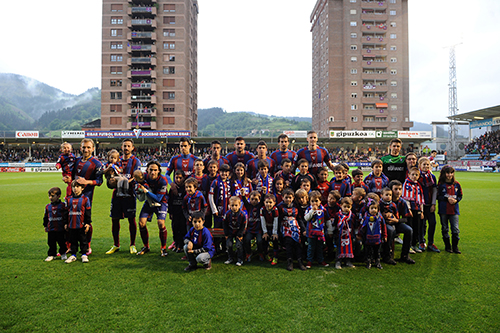
The team that has achieved a historic promotion | Photo: EL DIARIO VASCO
Often referred to as the “gunsmithing” club (known this way because the town was home to a large number of arms manufacturers that have historically operated there), Eibar holds the record of 18 consecutive seasons in the 2nd Division Spanish League and will multiply its budget by five. But Aranzabal (in one of the many interviews given these weeks to radio stations like Onda Cero, Cadena Ser…) has already announced that their feet are on the ground: “We will take it very calmly and will continue to do things as usual. It is our way of understanding this.” Only seven of the 23 players had contracts at the end of the season.
There will be one-year commitments and requests for assignments for players from teams like the Real Sociedad, the Athletic of Bilbao and more. Clubs see a habitat for growth in Eibar, sending young players who have little opportunity to gain experience where they are playing. Salaries will be at comparable levels amongst all players with nobody earning exaggerated amounts in comparison to other players.
In this historic season, eight of the eleven players making up the starting line-up were already starters in 2nd Division B (the third division of the Spanish soccer league). The coach, Gaizka Garitano, is the same as last season, who made his debut after coaching a younger team within the club for a couple of years. He is a former player and the former captain of Eibar who almost achieved promotion to 1st Division a decade ago. This year, he has pulled it off, but as coach.

The Eibar team celebrating the promotion to 1st Division | Photo: EL DIARIO VASCO
“When you say Eibar in soccer, you conjure up images of effort, getting muddy, sacrifice, sticking to the fight, a small team standing up to the challenge. Over decades Eibar has built a brand and this is just the culmination of many people and many players, some of whom have been world champions,” says Alex Aranzabal in another interview. World class stars Xabi Alonso and David Silva have grown up in Ipurua, a stadium in which one of the two side stands has less than five rows of seating.
Four of the Eibar players have been named to the “Ideal Eleven” team of the 2nd Division this season. The goalkeeper and two defenders hold the record for least goals conceded in their category (only having allowed 28 goals against them), and a forward, who was responsible for the goal sending them to promotion. After 42 league matches, the reliability and consistency of Eibar have been the key. With no lopsided losses (except for a 0-3 loss in the second game), Eibar has only lost 9 games, tied 14 and won 19. Amongst the losses were two away games against 2nd Division Real Madrid and FC Barcelona; and at least one game against three teams that were in 1st Division the previous season: Deportivo, Zaragoza and Mallorca.
This last team, which in the last decade managed to earn a spot in the European Champions League, was saved by only one point from descending to 2nd Division B. Its budget is about 22 million euros (30 million dollars), more than five times Eibar’s budget, who sits well above Mallorca in the standings, with a 20-point difference. Defense and stability have been the foundation in the approach of this miraculous Eibar, whose offensive strategy is far from the historical stereotype of playing long balls in the frequently muddy “Ipurua” field, but instead has chosen to play a tighter, quality game with a passing attack. And it has written a different story, as its President acknowledged in another interview: “Soccer is in need of different kinds of stories. The epic, David who can beat Goliath. The underdog, with fewer resources, faced against its more powerful opponents. Nowadays, with so many people unemployed and upset, this kind of story is really appreciated.”
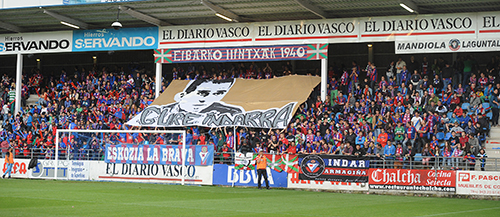
Ipurua, the small stadium in Eibar, where world class stars will be received this coming season | Photo: EL DIARIO VASCO
Off the field there are no mysteries either. The philosophy is easy. They apply the simple family rule: always spend less than you earn. A basic theory, yet one that so few soccer clubs apply, with the majority drowning in debt. “Doing things right, being austere, being responsible, valuing what they have, and taking great care of it, they are making history. In fact, they have been operating this way for many years,” says Xabi Alonso in a conversation with journalist Iñaki Gabilondo. Soccer has gone overboard now even more than at the beginning of the first decade of the millennium.
The situation of the Extremadura soccer club at the end of the 1990s is a similar example to that of Eibar’s. The city of Almendralejo (province of Badajoz) had around 27,500 inhabitants. It had a 9 million euro budget (12 million dollars) compared to 60 million euros at Real Madrid (81 million dollars). This year, the nearly 20 million euro budget of Eibar (27 million dollars) will face off against the nearly 500 million euro budget (680 million dollars) of the reigning champion of the Champions League. For every euro that soccer brings to town now, next season it will mean 10.
This showering of money, however, will not help Eibar achieve legal requirements which, if it fails, can send it back to 2nd B. Returning to a professional category, the law requires that social capital is at least at 25% of the average budget in 2nd Division: 2.1 million euros (2.8 million dollars), even though Eibar’s budget is 3.9 million euros. With its typical veteran spirit, based on defense, the club has launched a media campaign “defiendealEibar” in social networks. They need to raise 1.7 million euros before August.
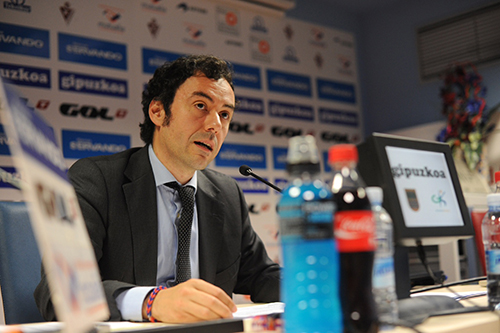
Alex Aranzabal, President of Eibar | Photo: EL DIARIO VASCO
It’s a law that many have considered “unfair” as expressed in the Latin proverb: dura lex sed lex (the law is harsh but it’s the law). “Even if we get the capital increase, the law must change because it produces effects that don’t make sense, as in our case: a healthy club, debt-free, yet being forced to increase capital.” The total debt of Spanish professional soccer, which includes Eibar, Real Sociedad and Athletic Club of Bilbao (all three in enviable situations both in economic and athletic terms), was 3.5 billion euros in 2013 (4.8 billion dollars). Aranzabal repeats: “I hope, with my heart in my hand, that this changes, although it’s not going to affect us.”
It will not affect them because the club, whose first team ended the season like other past seasons with a fun bike race to the summit of the local port of Arrate, is going to reach the goal for the capital increase. After the initial phase, in which only the shareholders could buy new shares, only 9% of shares were issued. By the day when they got the promotion to 1st Division, it was 38%. And just four weeks later, 85% has already been exceeded. And it’s still growing. Any contribution cannot exceed the cap of 100,000 euros. They want their family-like club to belong to many people.
This has been the new example of the philosophy of Eibar both on the field and this time off the field. And this way, emerging from 2nd B to 1st Division in one year and buying the confetti from FC Barcelona that the Catalonians had prepared in the event of a league victory, the team from the arms town will debut in 1st Division and will achieve its goal for capital increase. “Don’t ask me how, but we have to get there,” Aranzabal said. Calmly and humbly, but making history nonetheless.
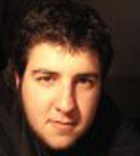 |
Jurdan Arretxe is a reporter for “Noticias De Gipuzkoa” |
| @Jurdan |



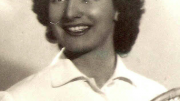


Be the first to comment on "Eibar: a Basque Team Making History"